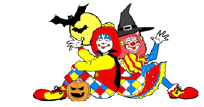During training, hospital clowns should be taught proper hand-washing, which involves rubbing hands together for two verses of “Happy Birthday”, rinsing thoroughly, turning off the faucet using a paper towel, then taking a new paper towel and thoroughly drying hands. Keep in mind that the water need not be hot and regular soap should be used more often than antibacterial soap to avoid removal of the body’s normal flora. Proper hand-washing should be done after checking in at the nurses station but before visiting patient rooms. Hand sanitizer should be used in between room visits.
Hand-washing is not the only type of hygiene to be vigilant about during clown rounds, however. Clown doctors or nurses should always reserve one of their many pockets as a mini hamper. This “dirty pocket” is to be the temporary home for anything that may have gotten contaminated or dropped in a room with “contact precautions” (we don’t enter rooms with “airborne” or “droplet” precautions). These are items you plan to keep, but you can freely give away items if you won’t be taking them out of these rooms. Be mindful of juggling-it is very easy to drop a juggling prop. Always try to juggle items you can easily wash without ruining. Do not perform magic tricks that require the patient to touch something unless it’s staying in a “contact” room. If it’s in a regular room, again, try to make sure your props are washable.
At the end of a shift it is necessary to wash or sanitize dropped and contaminated items. You should use soap and water, but you can also use an antimicrobial spray on these items as well as on shoes, dance ribbons, hats, juggling props, magic props and puppets. If you prefer to avoid chemicals you can try mixing vinegar, soap and water or you can mix rubbing alcohol with water. You’d pour the mixture in a spray bottle and take it along or you can keep all your items in a non-porous bag and wash them when you get home.
All this cleaning may sound like paranoia, but it not only keeps your items clean for your safety as well as your patients’ safety, it is a requirement. OSHA regulations are in place to prevent cross-contamination between patients.
If you visit a contagious patient and then you visit an immunocompromised patient [such as one on chemotherapy] without sanitizing your hands or props, you have now spread microbes that can be deadly to the second patient.
The biggest problem with microorganisms is that you cannot see them, making cleaning a critical part of interacting with patients. And no...there is no 30-second rule! Microbes don’t follow rules. Contamination can happen UPON CONTACT.
 Lucy E. Nunez is an LPN and has been a theatrical performer since 2002. She created Nurse Lulu for the Big Apple Circus Clown Care Unit at Nicklaus Children's Hospital in 2014. She was a resident clown there and at Baptist Children's Hospital. For more information please visit: www.sunnybearbuds.wix.com/buds
Lucy E. Nunez is an LPN and has been a theatrical performer since 2002. She created Nurse Lulu for the Big Apple Circus Clown Care Unit at Nicklaus Children's Hospital in 2014. She was a resident clown there and at Baptist Children's Hospital. For more information please visit: www.sunnybearbuds.wix.com/buds
